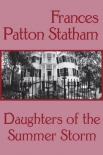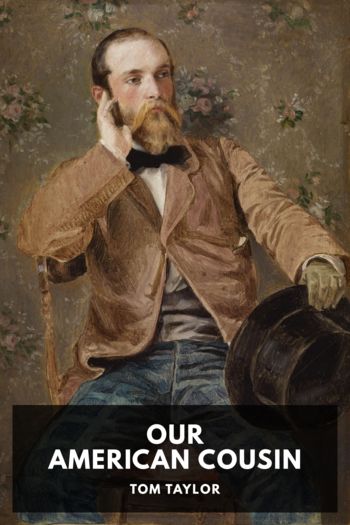Daughters of the Summer Storm by Frances Statham (best sci fi novels of all time .TXT) 📗

- Author: Frances Statham
Book online «Daughters of the Summer Storm by Frances Statham (best sci fi novels of all time .TXT) 📗». Author Frances Statham
Marigold barely remembered the man that her mother's cousin had married. He had been dead for such a long time, Desmond Caldwell had, but she knew from her own maman that he had loved Julie very much. So much so that he had brought home a dark-haired eight-year-old orphan for her to mother, since she was childless.
Now Crane was twenty-six years old, no longer an orphan, but a man of means, having inherited Cedar Hill Plantation and the gold mine adjacent to it. And this same man sat beside her as her unwanted husband.
"I plan to move into the cottage, Crane, when we get back home," Julie's quiet voice informed her son. "You and Marigold shall have the big house. . ."
"No," Marigold interrupted. "We cannot allow her to do that, can we, Crane?" she implored. When he did not respond, Marigold turned to Julie. "Cedar Hill is your home. We cannot push you out of your own house."
She was panic-stricken to think that she would be alone in the big house with Crane.
Julie merely smiled and brushed aside Marigold's objection. "When you are newly wed, you don't need an old woman in the house with you constantly."
"But—"
Marigold's objection was cut off. "Don't protest so much, Marigold," Crane said. "I think it's a good idea, Mother. And we are appreciative that you are so understanding. Aren't we, Marigold?"
Her hesitation prompted a hand on her arm. "If you do not agree, Mother will think that you are afraid to be alone with me, Souci," he purred, his soft, teasing voice at odds with the increasing pressure of his fingers on her arm.
"T-Thank you, Cousin Julie," Marigold managed to say. "You are very thoughtful."
The meal was set before them, and Crane released Marigold's arm.
For the next three days the pattern was the same. Stopping at an inn each night and arising early the next morning, they made their way up the Cherokee Trail. Then, at Nelson's Ferry, the carriage left the trail to proceed northward toward the land of the Waxhaws in upper Carolina.
To Marigold, looking out the window of the carriage, the frenzied, moving landscape echoed her own restless spirit. Frantic drifts of leaves, caught up by the wind, sailed through the air—colors of red and yellow and deep purple torn from their moorings, with no certain destination but downward, where they were crushed by carriage wheels and horses' hooves. And the farther north the carriage went, the more alien the land seemed to the golden-haired bride who stared out the window.
Gone were her sandy dunes, the black water verging the roadway. In their place were flamboyant red hills, catching the glare of the afternoon sun, and blood-red puddles of water, drained from the adjacent hills—treacherous patches spread over the road, waiting to imprison an unsuspecting carriage wheel in the gripping, grasping mud.
"Close the window curtain, Marigold," Crane ordered. "You're apt to get mud spattered inside the carriage."
The voice of her husband, who was seated across from her, brought Marigold out of her oblivion. Before she could respond, Julie's gentle voice pleaded, "This is Marigold's first trip to the up country. I am sure she is eager to see as much along the way as she can. Let her keep the curtain open, Crane."
"I was only thinking of you, Mother," Crane explained. "I did not imagine you would enjoy having mud ruin your dress."
"I am already travel-stained, son. It won't matter to have a little more dirt added to it."
But already, Marigold was closing the curtain. Julie turned to Marigold and said, "Keep the curtain open if you like, my dear."
"Thank you, Cousin Julie. But I. . . I have seen enough for now." Marigold yawned and leaned her head against the seat.
"I expect you are tired of traveling," Julie commiserated. "Sometimes I think the road will never end, and just when I despair of ever seeing Cedar Hill again, then the landscape becomes familiar and I'm home again."
Home again. Would Marigold ever feel that way about Cedar Hill? Could it ever take the place of Midgard Plantation where she had grown up?
The malaria season would be over soon, and her maman and papa would close up the townhouse and return down Biffers Road through Emma's Bog to the old plantation house that had been in the family for almost a hundred years—Robbie and baby Raven, and Maranta. And Jason, her older brother who would be returning home in another month from the Grand Tour, would join them, too.
Marigold closed her eyes, the image of the plantation house impressed upon her memory—and the little river house, hidden in the maze of honeysuckles and yew, high up on the river bluff where she and Maranta had played with their dolls.
Shaun Banagher's face invaded her memories, and sadness was mixed with anger. Because of him, it would be years before she would feel free to go home again—to enjoy the St. Cecilia Balls, the race season in February, the theater, and the socials from house to house at Christmastime.
An exile—that's what Shaun Banagher had made her. But no. He would not get away with it. Who was he to cause her to spend the rest of her life on some godforsaken plantation in the up country?
She would show him. If she played her cards right, she would once again be the toast of Charleston. No one would ever believe she had been jilted by Shaun Banagher.
The plans began to formulate. Unconsciously, her hand went up to her cheek, and Marigold winced. It was still sore and discolored. What a fool she was to antagonize Crane at the very beginning of their marriage—to fight him. She would have to learn to handle him better than that if she wanted her plans to succeed.
The monotonous swaying of the carriage lulled her to sleep. Farther north the carriage moved, the horses straining in the uphill climb. Then





Comments (0)